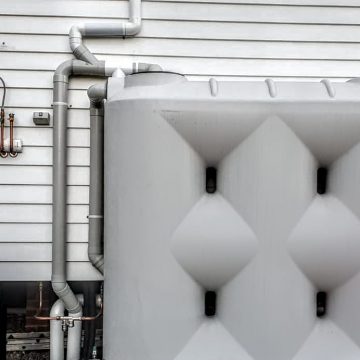In an era where sustainability is not just a buzzword but a necessity, the practice of saving rainwater emerges as a beacon of hope. This ancient method, once a survival strategy, has now become a modern-day mantra for environmentally conscious individuals and communities. Here are the top six benefits of saving rainwater, underscoring why this practice is more relevant today than ever.
Reduces Water Bills and Promotes Self-Sufficiency
One of the most immediate benefits of harvesting rainwater is the significant reduction in water bills. By collecting and utilising rainwater for gardening, flushing toilets, and washing cars, households can reduce their dependence on town water supplies. This not only leads to financial savings but also promotes a sense of self-sufficiency in water usage, an invaluable asset in times of water scarcity. Saving rainwater in a tank provides individuals with the freedom and flexibility to use their water supply as they choose.
Alleviates Strain on Municipal Water Systems
Particularly in Australia, which is a drought prone country, urban areas often face the challenge of managing peak water demand, especially during dry spells. In some cases, local councils and water management authorities introduce water usage restrictions. Rainwater harvesting can relieve pressure on municipal systems by reducing the demand. Conversely, it is also particularly beneficial in preventing overflows in sewage treatment facilities during heavy rains, thereby minimizing the risk of waterborne diseases.
Environmental Conservation and Reduced Carbon Footprint
By capturing rainwater, individuals can make the best use of one of Earth’s most valuable natural resources. This in turn helps to reduce the runoff and soil erosion that transports pollutants into creeks, rivers and oceans, protecting aquatic ecosystems from contamination. Moreover, the energy consumed in treating and pumping water from centralized systems is substantial. Using rainwater, especially for non-potable purposes, decreases energy demand, thereby reducing the carbon footprint associated with water provision.
A Source of Pure Water
Rainwater has a neutral pH, and is naturally soft and devoid of minerals, chlorine, and other chemicals found in municipal water. This makes it a pure water source and an excellent choice for gardening, cleaning, and even drinking. Plants thrive on rainwater as it closely mimics the natural water cycle. Nutrient uptake is optimised, leading to healthier plant growth and reduced chemical use in gardens. Rainwater also lathers well, making it ideal for cleaning, especially washing cars and windows. Importantly, rainwater is safe for drinking, and contains no added chemicals, and no unpleasant taste or odour. There may even be health benefits in drinking fresh water as opposed to mains water.
Enables Legal Compliance and Increased Home Values
In New South Wales, new builds and some home renovations are required to meet energy and water efficiency targets. This system is known as the Building Sustainability Index, or BASIX. Installing a rainwater tank is an easy way to comply with BASIX regulations. Once installed, a well-designed rainwater harvesting system has the potential to increase the value and appeal of a home, due to both aesthetic appeal and water usage efficiency.
Fosters Community Engagement and Awareness
The practice of saving rainwater often involves community participation and education. It fosters a sense of collective responsibility towards water conservation, encouraging individuals to engage in sustainable practices. Communities that embrace rainwater harvesting become models of environmental stewardship, inspiring others to follow suit.
In conclusion, the benefits of saving rainwater extend far beyond mere water conservation. They touch upon economic savings, environmental protection, community engagement, and the promotion of a sustainable lifestyle. As the world grapples with the challenges of water scarcity, the ancient wisdom of harvesting rainwater shines as a simple yet powerful solution. It’s a testament to how individual and collective actions can pave the way for a greener, more sustainable future.

